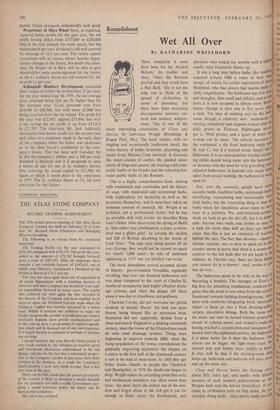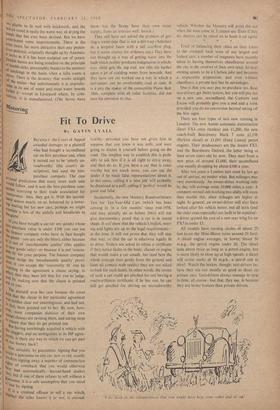Roundabout
Wet All Over
By KATHARINE WHITEHORN
This is a highly comprehensive book, dealing with washstands and commodes and the history of soap, with medicated and ceremonial baths, with euphemisms for lavatories as well as the lavatories themselves; and it must have taken an immense amount of research. Mr. Wright is an architect, not a professional writer; but he has an enviable skill with words : he describes King Lear's father (who discovered the spring at Bath) as 'that rather rare combination, a leper, a swine- herd and a glider pilot'; he laments the decline and fall of Roman plumbing in the words of Lord Grey : 'The taps were being turned off all over Europe; they would not be turned on again for nearly -1,000 years'; he tells of bathmais appearing in 1325 'not yet labelled TAM HTAH: The book demolishes several accepted elicit& of history : pre-revolution Versailles, reputedly revolting, had over one hundred bathrooms and was clean compared to the court of Charles II; medieval monasteries had highly effective drain- age systems, and when the plague left them alone it was due to cleanliness, not godliness.
Charlotte Corday did not overcome her girlish modesty to murder Marat : his bath was quite decent, being shaped like an enormous boot. Sanitation did not, apparently, decline from a clean and merrie England to a stinking nineteenth century, since the towns of the Elizabethans made do with rural drainage systems. Things were beginning to improve towards 1800, when the rising population of the towns overwhelmed the gradually improving sanitation—the chapter on London in the first half of the nineteenth century is not to be read at meal-times. In 1865 they got better drains (thanks to people like Chadwick and Bazalgette); in 1870 the death-rate began to drop. Wright makes the surprising point that early bad mechanical sanitation was often worse than none: the poor threw the ordure out of the win- dow and forgot about it; the rich got it just far enough to fester under the floodboards, and plumbers who looked for trouble with a lighted candle were frequently blown up. It was a long time before baths, like maidens acquired around 1800 a room of their 001 except, of course, for earlier equivalents of JaYtti Mansfield, who had always had marble baths ° chilly magnificence. The bathroom was first lalVi and draughty, then small and cellular, and in thaii form it is now accepted in almost eyery Brlt house—though at least one in five never tal"' a bath. The idea of washing only in the bath: room, though, is relatively new : washstands 01 varying complexity and elegance looked after 0 daily grime—as Florence Nightingale stern') put it, 'With privacy and a quart of water an) woman can be clean.' The natural successor t° the washstand is the fixed bedroom basin witli H. and C.; but if a normal house simply has a bathroom, it is an open question whether increa5. ing riches should bring water into the bedroonls or do away with the need for it by providing rn°re adjacent bathrooms. It depends very much W115 apart from actual washing, the bathroom is beirig used for.
For, over the centuries, people have taken sociable bath's, healthful baths, ceremonial baths. mortifying, excruciating and occasionally evert fatal baths; but the interesting thing is that the baths taken for cleanliness alone seem to have been in a minority. We, mid-twentieth-centorY' think we bath to get the dirt off; but it is deb' able. Anyone who reads, eats, drinks or stays a bath for more than half an hour can hardlY claim that this is just an extension of washing behind the ears. The fact that showers—cheaPet.' cleaner, quicker—are so slow to catch on in thls country seems to prove that there is a womb-like comfort to the hot bath that we are loath to d° without. As Thurber says, there are three things you cannot do in a shower : read, smoke or get wet all over.
The bathroom seems to be well on the way 10 becoming a boudoir. The manager of FroY's• big firm for plumbing installations, confirms nlY guess that the trend is now away from the strictlY functional towards bathing-dressing-rooms, cony plete with vanitories (disgusting word, admirable object—a basin set into a fixed dressing-table). carpets, decorative fittings. Both the room and the water can now be heated without producing clouds of ruinous steam; and women's make-LIP having reached a complication and messiness tin' known since the eighteenth century, the bath rooni is a place better for it than the bedroom. The mirror can be bigger, the light more cruel, thc massed pots and bottles more readily to hand. It may well be that if the dressing-room idea keeps up, bathroom and bedroom will once more end up the same size.
Clean and Decent leaves the sluicing stall' about fifty years ago, and speaks with diluted sarcasm of such modern achievements as the Perspex bath and the hot-air hand-dryer. If nor claim to civilisation rests on that alone, ,we are, certainly doing badly : since plastic baths are still lt)(' Pliable to fit well with brickwork, and the h°t-air towel is easily the worst way of drying the hands that has ever been devised. But we have contributed some improvements. There is the lotus basin, far more attractive than any preten- tious pedestal; originally thought up by Adamsez, It looks as if it has been sculpted out of cream. bouble basins are being installed on the principle of double sinks, presumably thanks to the memory of stockings in the basin when a fella wants a shave. There is the lavatory that works straight Oil the mains—but unfortunately it is unpredic- table in its use of water and most water boards f %id it----except in Liverpool where, by coin- cidence, it is manufactured. (The Savoy have them—but the Savoy have .their own water supply, from an artesian well. Swank.) They still have not solved the problem of get- ting a waste-pipe that is not a dirt-trap (Adatnsez do a hospital basin with a tall overflow plug, but it seems clumsy for ordinary use.) They have not thought up a way of getting water into the bath which neither produces indignation in which- eve' child gets the tap end, nor lifts the bather upon a jet of scalding water from beneath. And they have not yet worked out a way in which a newspaper can be comfortably read at soak. It is a pity the maker of the convertible Piano Bed. 1866, complete with all toilet facilities, did not turn his attention to that.



































 Previous page
Previous page